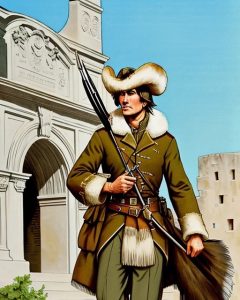Davy Crockett, also known as the “King of the Wild Frontier,” embodies the rugged individualism and pioneer spirit of early 19th-century America. Born in 1786, his adventures as a frontiersman, soldier, and politician have made him a beloved folk hero. His legendary status was solidified by his exceptional hunting abilities and his captivating stories of life on the untamed frontier, which were both self-written and embellished by others.
Despite his larger-than-life persona, Crockett’s journey into public service began humbly with his election to the Tennessee state legislature in 1821, followed by his subsequent election to the U.S. House of Representatives in 1827. As a Congressman, he was a fierce advocate for the rights of settlers and a vocal opponent of President Andrew Jackson’s controversial Indian Removal Act. This unwavering stance showcased Crockett’s unwavering commitment to justice, even in the face of political pressures.
However, it was Crockett’s death at the Battle of the Alamo in 1836 that cemented his place in American legend as a symbol of bravery and sacrifice. In the midst of Texas’ fight for independence from Mexico, Crockett’s courageous stand at the Alamo became a symbol of resistance against oppression. This multifaceted legacy, encompassing folklore, legislative impact, and military valor, solidifies Davy Crockett’s enduring status as an iconic figure in American history.

